Iranian Dissident Figure In House Arrest Calls On Military To Support Nation

Iranian dissident figure Mir-Hossein Mousavi has expressed support for the current protests across Iran, calling on the military to stand behind the nation.

Iranian dissident figure Mir-Hossein Mousavi has expressed support for the current protests across Iran, calling on the military to stand behind the nation.
Mousavi, who has been under house arrest since February 2011 as one of the leaders of the protests in 2009-2011 known as the Green Movement, issued a statement Saturday addressing the military forces, "I hope you will be able to stand on the side of the truth, on the side of the nation."
"No one has the right to stand in front of the nation as a blind agent," he said.
Mousavi (Musavi), 81, was Iran’s Prime Minister from 1981 to 1989. He was a candidate in the disputed presidential election in 2009 and challenged the results leading large protests for months before he was arrested and put under house arrest without a trial. His wife Zahra Rahnavard and another candidate Mehdi Karroubi suffered a similar fate as all three were accused of “sedition” against the regime. He was put under house arrest after he and his wife urged their supporters to organize demonstrations in support of uprisings in the Arab world in February 2011.
His statement has been met with conflicting responses from Iranians -- who have been holding daily demonstrations across the country since mid-September, when 22-year-old Mahsa Amini was killed in custody of hijab police – as the new wave of protests is essentially different from earlier ones.
The current protests are against the entire Islamic regime, which was not the case for Mousavi’s Green Movement in which people were seeking reforms.
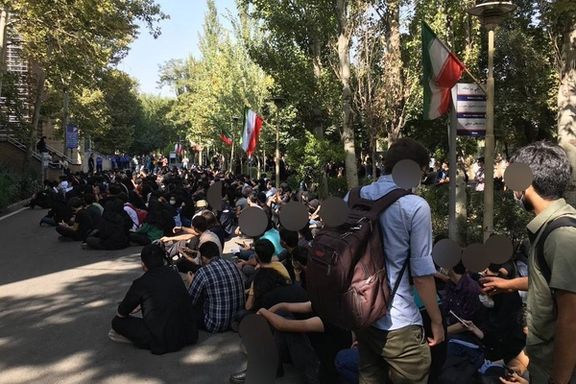
The Islamic Republic found itself under a multi-flank attack Saturday, with university students across Iran protesting, and rallies taking place around the world.
Protests and strikes at around 100 universities began Saturday morning as planned. Universities in Tehran, Esfahan, Mashhad and other cities were scenes of strikes. As classes resumed on the first day of the week, students entered campuses but refused to attend lectures. Instead, they began protesting.
Students have called for a general strike and dozens of professors have supported their call and demanded the release of those students who have been arrested so far.
There were also crowds outside university gates in the streets.
A general strike also commenced in Kurdish towns and cities in the west of the country and more street demonstrations are expected throughout the day and especially in the evening.
The killing of at least 19 Sunni Baluchi protesters in Zahedan, southeast Iran on Friday, shocked the country and was the first mass killing in one location since the protests began two weeks ago. It intensified demonstrations Friday evening that began on September 16, when Mahsa Amini, a 22-year-old woman died in hospital after receiving fatal wounds in the custody of Iran's hijab police.
A social media account has claimed 42 people were killed on Friday and has published their names.
Rallies in support of Iranian protesters already took place in Australia, New Zealand, South Korea and Jakarta on Saturday and many large gatherings are expected in Europe and later in North America.
Here we will provide live coverage of university protests, and later will report on street protests as they happen, possibly in a new thread.
We ended this live coverage at 15:30 local time and began a live coverage of street protests, after university students poured into the streets and other people joined them.
Follow our website for the latest on Iran protests.
--------------------------------------------------------------------------------------------------------------------------
Pro-regime Basij members attacked protesting students in tehran university. In this video, students rush toward the attackers and shout "Shame on you.
--------------------------------------------------------------------------------------------------------------------------
People gathered in the streets arounf the Azad University in Karaj, west of Tehran to support student who are protesting on campus.
-------------------------------------------------------------------------------------------------------------------------
Students and ordinary protesting in Gohar Dasht, 20 miles west of Tehran in support of university demonstrations and strikes on Saturday.
--------------------------------------------------------------------------------------------------------------------------
University of Shiraz students protesting on Saturday, joining dozens of other campuses around the country.
--------------------------------------------------------------------------------------------------------------------------
In another university in Esfahan Province students chant "This is the year of blood, Seyyed Ali will be done", referring to Ali Khamenei.
--------------------------------------------------------------------------------------------------------------------------
An unconfirmed report at 11:30 local time says security forces firing guns outside the University of Esfahan and they closed the entrance to the city's subway. The video below shows the protest outside the university before security forces began firing.
--------------------------------------------------------------------------------------------------------------------------
Large protest march in the University of Mashhad on saturday. Mashhad is the second largest city in Iran and an important religious center.
--------------------------------------------------------------------------------------------------------------------------
Hundreds of student gathered on the campus of Tehran University Saturday morning, announcing a strike and demanding the release of political prisoners.
--------------------------------------------------------------------------------------------------------------------------
Student protesting in the Science and Industry University of Tehran.
--------------------------------------------------------------------------------------------------------------------------
Protest in the University of Esfahan Saturday morning.
--------------------------------------------------------------------------------------------------------------------------
A large protest in the University of Yazd, a relatively conservative city in central Iran.
--------------------------------------------------------------------------------------------------------------------------
Hundreds of students protesting in the University of Zanjan on Saturday.
--------------------------------------------------------------------------------------------------------------------------
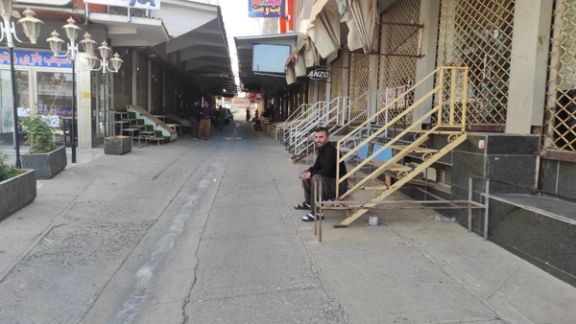
Business owners and merchants have announced strikes in Kordestan province and other western provinces with Kurdish population, such as East and West Azarbaijan and Ilam.
Unions and guilds in 15 cities, including Orumiyeh (Urmia), Oshnavieh, Mahabad, Piranshahr, Sardasht, Saqqez, Marivan, Sanandaj, and Ilam are on a massive strike, Hengaw Organization for Human Rights reported on Saturday.
Last week, businesses in Kordestan held another round of strike in protest to Iran’s Revolutionary Guard’s attacks on Kurdish groups in Iraqi Kurdistan, which have killed dozens of people so far. Amid nationwide protests in Iran sparked by the death in custody of a 22-year-old Kurdish woman, Iran’s Revolutionary Guard has stepped up its attacks on the region, apparently aimed at intimidating the Kurds.
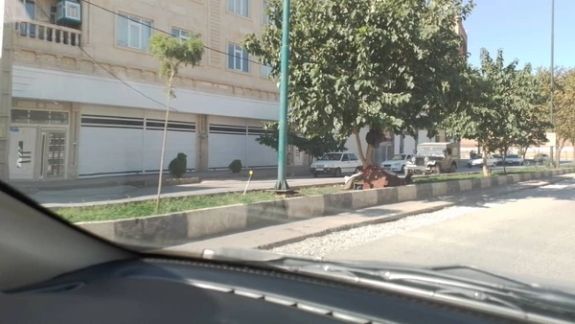
The cooperation center of Kurdish parties of Iran called for the strikes in protest against the IRGC's missile and drone attacks on the civilian headquarters of these parties in the region.
NetBlocks, a watchdog organization that monitors cybersecurity and the governance of the Internet, also confirmed on Saturday that the Internet access has been shut down in most of the areas that are on strikes as well as the southeastern province of Sistan-Baluchestan.
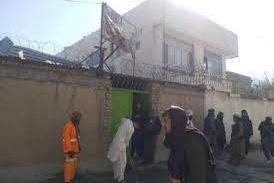
The intelligence chief of Iran’s Revolutionary Guards in the southeastern province of Sistan and Baluchestan was shot dead in the provincial capital Zahedan.
Confirming the death, the IRGC-affiliated Tasnim news said in addition to Colonel Mousavi, three other members of IRGC and its Basij paramilitary force were killed and 32 of more injured in Zahedan clashes on Friday.
Zahedan was the scene of violent clashes between Iran’s security forces and armed groups that attacked three police stations in the afternoon and started shooting at 16 police stations.
According to unconfirmed reports by local Baluch sources from the mainly Sunni city of Zahedan, at least 42 people were killed and 200 more were injured on Friday as police opened fire at protesters.
Molavi Abdolhamid, the religious leader of Iran’s largely Sunni Baluch population living in the province and Iran's top Sunni cleric, has called on the Law Enforcement forces to crack down on protesters.
The Sunni cleric in Iran, sometimes critical of the government, confirmed reports last Friday about the rape of a 15-year-old girl in June by Colonel Ebrahim Khouchakzai, the commander of the police in the city of Chabahar.
That incident and the current protests in other cities triggered the tensions in Zahedan on Friday.

A group of seminary students and teachers in Iran said Friday that Supreme Leader Ali Khamenei was never fit to be the Guardian of the people and a ruler.
Such a statement issued by a group of clerics is unprecedented. Coinciding with the ongoing nationwide protests during which protesters have chanted against Khamenei and his leadership, makes the statement even more significant although signatories did not reveal their names due to fear of retaliation.
The clerics further stated in the Friday September 30 statement that all those involved in murdering or wounding protestors should be punished based on "an eye for an eye" retribution principle of the Islamic law.
When Khamenei was selected by the Assembly of Experts in 1989 to succeed Ruhollah Khomeini, the founder of the Islamic Republic, he was not even an ayatollah, let alone a top ayatollah, inherently a requirement for someone to be the guardian of the flock. But over the years, he has been elevated to the “leadership of Muslims”.
The strongly worded statement charged that none of those in power in Iran and none of those who speak for the government on public stage possess due qualifications for what they do. The statement added that Khamenei is not a Mujtahid [a cleric qualified enough to interpret the Koran and the teachings of the holy prophet] and therefore, he cannot be a source of emulation [a high-ranking cleric who can advise the people on their lifestyle]. The statement added that seminarians have never pronounced him "a learned cleric".
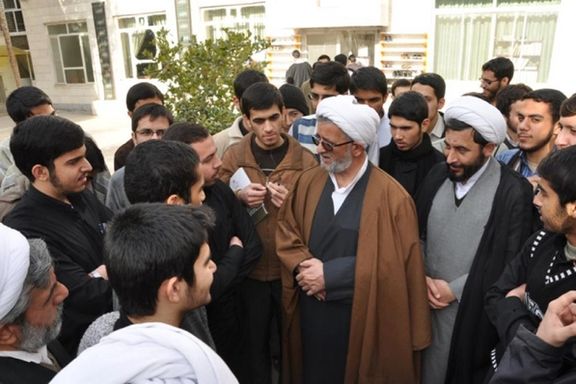
"Even if he’d held the qualifications for leadership when he was elected by the Assembly of Experts, the many crimes he has committed as well as his despotism and arrogance have effectively deposed him from his post as Supreme Leader." This, the clerics said, make all of his rulings and those made by his appointees illegitimate.
The statement strongly condemned shedding the people's blood and said a government that claims to be "Islamic" should stop shedding blood, adding that this is a major sin and those who commit it should apologize to the nation and be punished. Referring to the death in custody of Mahsa Amini, the statement said those who murdered her should be punished in a proportionate way, adding that the so-called morality police's behavior is not compliant with Islamic standards.
The clerics further charged that officials, commanders and managers of the morality police know nothing about what is prohibited and what is permitted in Islam. On the other hand, those they deal with have not shown a behavior that is prohibited in Islam. "The morality police's behavior, including assault and battery and murder, constitute an insult to Islam."
The statement further charged that Iran's Judiciary Chief Gholamhossein Mohseni Ejei is also not qualified for his job as chief justice and his rulings are against the religion. The statement also criticized Khamenei for appointing ill-qualified clerics as Friday Prayers Imams.
The statement said that Ahmad Jannati, the head of the Guardian Council, the final arbitrator on what is Islamic and what is not, has not written anything significant in his lifetime and lacks the right qualifications for tens of jobs he has been given by Khamenei.
This is the first time individuals from within the country's major seminaries have passed judgement on the qualification of officials appointed by Khamenei. The people and some politicians have previously criticized these officials for being incompetent, but no one on top of the government paid any attention to those criticisms.
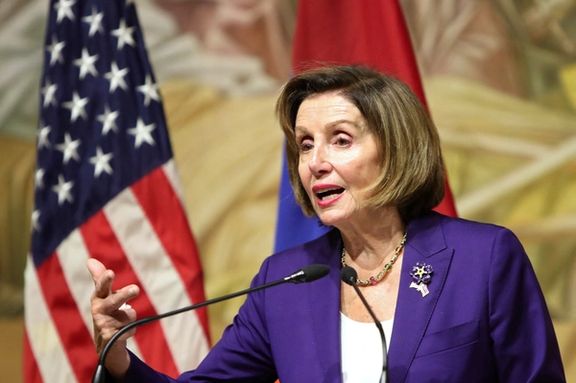
Amid global outcry over the death of a hijab victim in Iran that has sparked an uprising, Speaker of the US House Nancy Pelosi called the courage of Iranian women awe-inspiring.
Pelosi told Iran International’s correspondent that “we’re all in awe of the courage of the women of Iran” coming out to hold protests for their own personal freedom.
Calling Mahsa Amini’s death a heartbreaking “murder” by the Islamic Republic, she said it has provoked a response and “that anguish has turned into action that can be helpful in terms of freedom for women and others in Iran."
“If that leads to a change in government in Iran, we’ll see what happens there... let’s see how that change takes place,” she said, noting that when the Shah of Iran was overthrown in the 1979 revolution people thought the new government was going to be a democratic one. “The same people who fought so hard for removing the Shah ended up in jail by the same leaders that are there now,” she added.
Pelosi said that people had their hopes and prayers and they fought for change, and that change turned into “a very oppressive regime.”
She underlined that democracy is about security, economy, and governance, and “how you respect and treat your people” indicates how democratic a government is.
In addition to voices of support from the US House and the Senate, Secretary of State Antony Blinken also said on Friday that "When we see the Iranian Government firing on peaceful protesters, then cutting off people’s access to the global internet, we’re not only watching this. We’re taking action in response."
“We’ll continue to look for ways to support those who are engaging in expressing themselves peacefully in Iran as well as taking actions against those who are responsible for the most repressive human rights violations that one can imagine," he added.
On Thursday, a bipartisan resolution was introduced at the Senate, calling on the Islamic Republic to end its violent crackdown against peaceful protestors. Several representatives of the House also co-sponsored a resolution, H.Res 1397, condemning the Iranian government's "torture and murder of Mahsa Amini and its crackdown on protesters."
Earlier in the day, National Security Advisor Jake Sullivan said in his press briefing said that the US continues “to condemn the brutality and the repression against the brave citizens of Iran, the brave women of Iran, who are simply marching for their rights and their dignity and their justice." “We continue to stand with them — not just in word, but in deed.”
“We have issued several sanctions against Iranian entities for what they have done in this killing and brutality. And, yes, we will continue to look for targets to impose sanctions in response to these brutal human rights violations,” he added.
Special Envoy for Iran Robert Malley also said on Friday that "Fifty-four countries across the globe signed a statement proposed by Chile and Spain urging Iran to stop using force against peaceful protestors,” calling on the Islamic Republic’s authorities “to listen to this world-wide call and end the violence against their people."